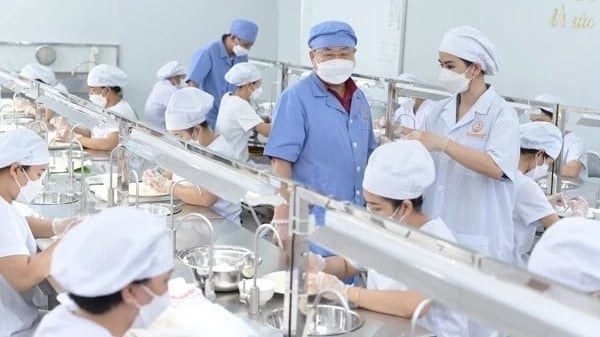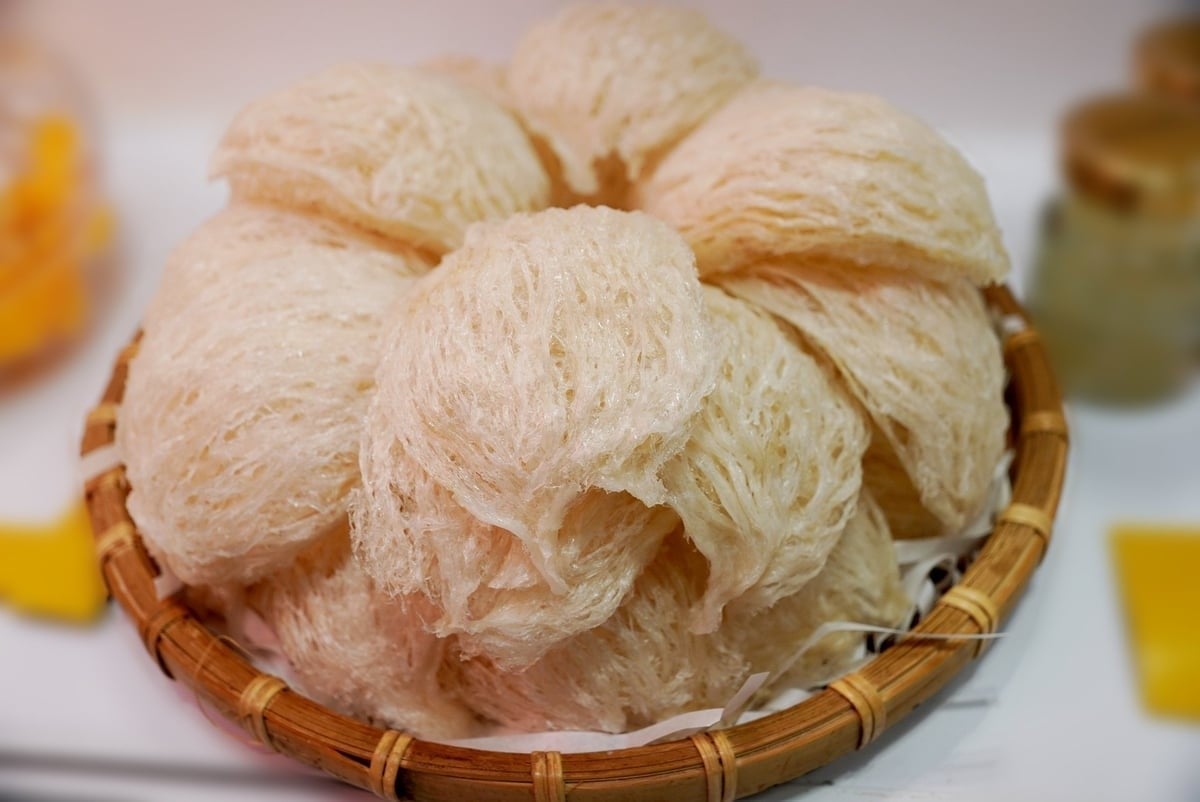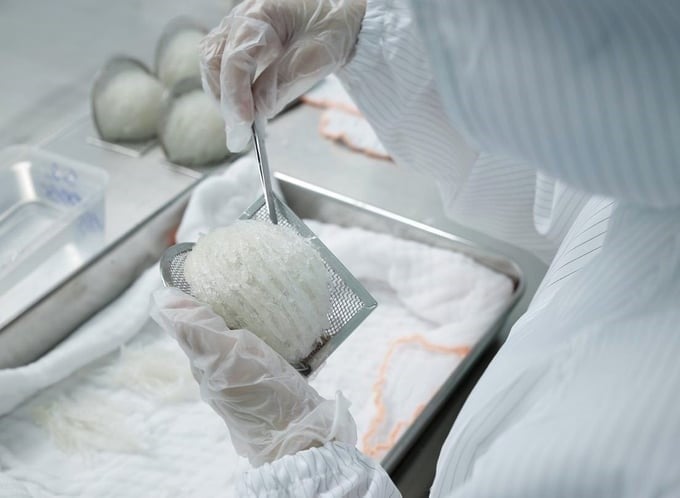December 12, 2025 | 08:43 GMT +7
December 12, 2025 | 08:43 GMT +7
Hotline: 0913.378.918
December 12, 2025 | 08:43 GMT +7
Hotline: 0913.378.918
As more Vietnamese bird's nest enterprises seek access to the billion-person market, the difference between aspiration and achievement becomes clear. According to Ms. Nguyen Thi Thu Ha, General Director of Avanest Vietnam Nutrition Joint Stock Company, the first Vietnamese enterprise granted permission to export bird's nests to China, companies must move beyond enthusiasm and focus on authentic, detailed preparation.

To enter the Chinese market, enterprises must thoroughly study China's regulations to make investments in their factories.
“Many enterprises are eager to enter the Chinese market. But eagerness alone is not enough. Drawing on Avanest's experience, I realized that enterprises seeking to enter the Chinese market must thoroughly study China's regulations to make investments in their factories, ensuring comprehensive, substantive, and quality preparations,” said Ms. Ha.
The representative of Avanest also noted that a factory must not only meet technical standards but also have genuine dedication to meeting both market demand and following the support of functional agencies. “It’s not about performing for inspectors. It's about doing it for real and doing it right,” she said.
In addition, it is necessary to avoid rushing registration dossier submissions before a company is truly ready. Incomplete or hastily prepared applications often lead to delays, as Chinese authorities return them for revision or supplement.
According to Ms. Ha, many enterprises are driven by the hope of immediate approval. But in reality, excessive haste results in missing documents or insufficient facility readiness. Based on Avanest’s experience, the company’s leader encouraged companies to perfect their operations first before proceeding with formal submissions.
Supporting this registration journey from intention to implementation is the Vietnam SPS Office, which plays a crucial role in guiding businesses through Chinese regulations. Sharing the same opinion as Ms. Ha, Mr. Ngo Xuan Nam, Deputy Director of the Vietnam SPS Office, reiterated the importance of sincerity and compliance. “First and foremost, successfully exporting not only bird’s nest products but any product requires genuine dedication. That dedication is demonstrated through strict compliance with market regulations,” he said.

Animal-origin products like bird's nests, which currently lag far behind seafood and agricultural exports, receive special attention from the Vietnam SPS Office. Photo: Nguyen Thuy.
Since China issued Decrees 248 and 249, which govern the registration and food safety management of foreign exporters, the Vietnam SPS Office has been tasked by the Minister of Agriculture and Environment to serve as a focal point. The office works across five specialized Departments under three Ministries, all responsible for ensuring food safety in exports. In particular, animal-origin products like bird's nests, which currently lag far behind seafood and agricultural exports, receive special attention from the Vietnam SPS Office.
Mr. Nam outlined the three phases Vietnamese enterprises must navigate to secure export approval from China.
Phase 1: Enterprises prepare dossiers
Enterprises must prepare and submit complete and accurate dossiers based on guidance from the Department of Animal Health. Every detail must be up to standard, even small things. “Even though China may not specify image resolution, companies must show the true spirit of their factories. Blurry photos have led to rejections,” Mr. Nam warned.

Enterprises must be honest in their declarations of production practices. Photo: Son Trang.
Most importantly, enterprises must be honest in their declarations. For example, if a company claims to house 5,000 workers in a 500-square-meter factory, it’s simply not credible. Or, if 500 employees share three sinks for handwashing in a single hour, it’s unfeasible.
The honesty must be reflected both in the documentation and in the actual production practices. Food safety directly impacts human health, so we must declare truthfully and accurately. Thus, this initial phase is critical. If enterprises fail to provide accurate information, delays are most likely to occur.
Phase 2: National Review
Once submitted, dossiers are reviewed by the Department of Livestock Production and Animal Health. If approved, they are passed to Chinese Customs. Otherwise, they are returned to the enterprise for correction.
Phase 3: Chinese Customs Review
At this stage, the General Administration of Customs of China (GACC) assesses and approves the documents. In particular, the Vietnam SPS Office maintains close coordination with the Chinese Embassy and the GACC to ensure timely processing. “Since 2022, this cooperation has helped secure monthly approvals for new Vietnamese agricultural products,” Mr. Nam shared.
Enterprises should note that gaining an export code is not the end, but only part of the journey. Under Chinese law, the GACC may fully cooperate with competent agencies to conduct either online or on-site inspections of these processing facilities. So compliance cannot be a one-time act for approval. It must be the enterprise's daily operating standard.”
Exporting bird's nests to China is not only a great opportunity but also a process that requires thorough preparation, strict compliance, and synchronous collaboration among businesses, local governments, and management agencies.
The implementation of the protocol is not merely to meet the Chinese side's requirements but also represents an important step to elevate Vietnam's bird's nest industry toward transparency, professionalism, and sustainability.
Translated by Thu Huyen

(VAN) Lang Son agricultural products are upgrading planting-area standards, increasing deep processing, and expanding linkages to move toward sustainable exports.

(VAN) Despite numerous challenges, Vietnam's key seafood products are maintaining strong momentum, setting the stage for full-year exports to potentially reach USD 11 billion.

(VAN) The signing of a protocol between Viet Nam and China on the export of fresh jackfruit represents a significant milestone in agricultural trade cooperation between the two countries.

(VAN) On November 27, the Ninh Binh Department of Agriculture and Environment and the Institute for Green Growth Research organized a training course on greenhouse gas inventory for businesses.

(VAN) China’s cooking oil is suddenly flooding into India. It all comes down to a soybean surplus that Beijing doesn’t quite know what to do with.

(VAN) An Giang promotes supply-demand connections, standardizes quality and builds value chains, creating a foundation for sustainable bird’s nest development and aiming to expand exports.
/2025/11/24/5339-4-nongnghiep-075331.jpg)
(VAN) Recently, the conference on 'Sustainable Fisheries Linkage Chain - Tilapia for Export' took place in Tien Hai commune, Hung Yen province.